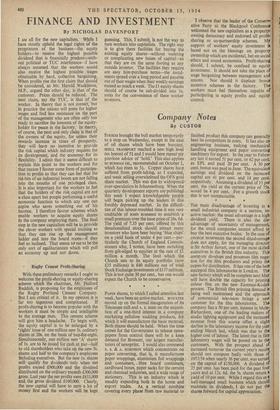FINANCE AND INVESTMENT
By NICHOLAS DAVENPORT
I AM all for the new capitalism. While I have stoutly upheld the legal rights of the proprietors of the business—the equity holders—to receive the highest possible dividend that is financially prudent—with- out political or TUC interference—I have always assumed that the workers would also receive the highest possible wages obtainable by hard, collective bargaining. When profits rise the first claim that should be considered, as Mr. Harold Watkinson, M.P., argued the other day, is that of the customer. Prices should be reduced. The next claim, say the TUC, is that of the worker. In theory that is not correct, but in practice the unions will press for higher wages and find less resistance on the part ' of the management who are often only too ' ready to sacrifice the interests of the equity- holder for peace in the factory. In theory, of course, the next and only claim is that of the owners of the equity, for unless their rewards increase in times of prosperity, they will have no incentive to provide the risk capital which industry requires for its development, and the economy for its flexibility. I admit that it seems difficult to explain this point to the workers and for that reason I favour some form of participa- tion in profits so that they can feel that the tid-bits of an industrial boom are not falling into the mouths of one privileged class. It is also important for the workers to feel that the holders of the risk capital are not a class apart but people performing a useful economic function to which any one can aspire who saves something out of his income. I therefore favour schemes which enable workers to acquire equity shares in the company employing them. The final step in the new capitalism will be to provide the clever workers with special training so that they can rise up the management ladder and into the board room—if they feel so inclined. That seems to' me to be the only sort of egalitarianism which will pull an economy up and not down.
- Rugby Cement Profit-Sharing With these preliminary remarks I ought to welcome the profit-sharing or equity-sharing scheme which the chairman, Mr. Halford Reddish, is proposing for the employees of the Rugby Portland Cement Company. But I am critical of it. In my opinion it is far too ingenious and complicated. If profit-sharing is to become popular with the workers it must be simple and intelligible to the average man. This cement scheme will give him a headache. To begin with, the equity capital is to be enlarged by a 'rights' issue of one million new 5s. ordinary shares at 20s. on the basis of two-for-eight. Simultaneously, one million new `A' shares of ls. are to be issued for cash at par—half to old shareholders who take up the new 5s. shares and half to the company's employees including executives. But the new ls. shares will qualify for dividends only when net profits exceed £900,000 and the dividend distributed on the ordinary exceeds £300,000 gross. Last year the net profits were £633,000 and the gross dividend £100,000. Clearly, the new capital will have to earn a lot of money first and the workers will be kept
guessing. This, I submit, is not the way to turn workers into capitalists. The right way is to give them facilities for buying the existing equity shares—without watering or complicating new issues of capital—so that they are on the same footing as any outside investor. The facilities they require are easy hire-purchase terms—the instal- ments spread over a long period and payable out of their wages when their weekly earnings exceed so much a week. The £1 equity shares should of course be sub-divided into Is. units for the convenience of these worker investors. I observe that the leader of the Conserv.. ative Party at the Blackpool Conference welcomed the new capitalism as a property-, owning democracy and endorsed all profit- sharing or co-partnership schemes. my support of workers' equity investment it based not on the blessings on property ownership which are incidental, but on social ethics and sound economics. Profit-sharing should, I submit, be confined to equity investment. It should not take the place of wage bargaining between management and unions. Nor should it displace bonus
incentive schemes in the factory. The workers must feel themselves capable of participating in equity profits and equity control.


































 Previous page
Previous page